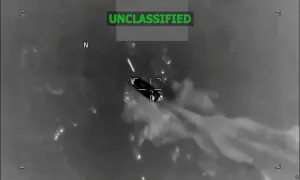North Korea conducts longest-range missile test yet over Japan
4 min readSEOUL/TOKYO: Nuclear-armed North Korea fired a ballistic missile over Japan for the first time in five years on Tuesday, prompting a warning for residents to take cover and a temporary suspension of train operations in northern Japan.
The Japanese government warned citizens to take cover as the missile appeared to have flown over and past its territory before falling into the Pacific Ocean.
It was the first North Korean missile to follow such a trajectory since 2017, and Tokyo said its 4,600 km (2,850 miles) range may have been the longest distance travelled for a North Korean test flight, which are more often “lofted” higher into space to avoid flying over neighbouring countries.
The latest launch was Pyongyang’s fifth in 10 days, amid military muscle-flexing by the United States, South Korea, and Japan. Last week, the three countries conducted trilateral anti-submarine exercises that included a US aircraft carrier, which stopped in South Korea for the first time since 2017.
Recent tests have drawn relatively muted responses from Washington, which is focused on the war in Ukraine as well as other domestic and foreign crises, but the US military has stepped up displays of force in the region.
Tokyo said it took no steps to shoot the missile down. Defence Minister Yasukazu Hamada said Japan wouldn’t rule out any options, including counterattack capabilities, as it looks to strengthen its defences in the face of repeated missile launches from North Korea. South Korea also said it would boost its military and increase allied cooperation.
“North Korea’s series of actions, including its repeated ballistic missile launches threatens the peace and security of Japan, the region, and the international community, and pose a serious challenge to the entire international community, including Japan,” Japan’s top government spokesperson Hirokazu Matsuno, told a news conference.
‘REAL-WORLD’ TEST
Officials in Tokyo and Seoul said the missile flew between 4,500 to 4,600 kilometres (2,850 miles) to a maximum altitude of about 1,000 km.
South Korea’s Joint Chiefs of Staff (JCS) said it appeared to have been an intermediate-range ballistic missile (IRBM) launched from North Korea’s Jagang Province. North Korea has used that province to launch several recent tests, including multiple missiles that it claimed were “hypersonic.”
The test prompted East Japan Railway Co to suspend train operations in the northern regions, Japanese broadcaster NHK reported. Matsuno said there were no reports of damage to aircraft or ships from the missile.
The initial flight details suggest the missile may have been the Hwasong-12 IRBM, which North Korea unveiled in 2017 as part of its threatened plan to strike US military bases in Guam, said Kim Dong-yup, a former South Korea Navy officer who now teaches at Kyungnam University.
Read more: North Korea fires ballistic missiles, the fourth time this week
The Hwasong-12 was used in 2017 tests that overflew Japan, and Kim noted it was also test fired from Jagang Province in January.
Flying a missile such a long distance allows North Korea’s scientists to test missiles under more realistic conditions, said Ankit Panda of the US-based Carnegie Endowment for International Peace.
“Compared to the usual highly lofted trajectory, this allows them to expose a long-range reentry vehicle to thermal loads and atmospheric reentry stresses that are more representative of the conditions they’d endure in real-world use,” he said.
“Politically, it’s complicated: the missile largely flies outside of the atmosphere when it’s over Japan, but it’s obviously distressing to the Japanese public to receive warnings of a possible incoming North Korean missile.”
North Korea’s flurry of missile testing helps make more of its weapons operational, develop new capabilities and sends a message that development is s sovereign right, analysts said.
North Korea’s missile and nuclear weapons programmes are banned by United Nations Security Council resolutions, which have imposed sanctions on the country.
POLITICAL BACKLASH
South Korean President Yoon Suk-yeol called the test “reckless” and said it would bring a decisive response from his country’s military, its allies and the international community.
He has pushed for more military muscle to deter the North, and South Korea staged its own show of advanced weaponry on Saturday to mark its Armed Forces Day, including multiple rocket launchers, ballistic missiles, main battle tanks, drones and F-35 fighters.
Speaking to reporters in Tokyo, Japanese Prime Minister Fumio Kishida called North Korea’s actions “barbaric”, and said the government would continue to gather and analyse information.
The launch over Japan was “unfortunate” and “not a productive path forward,” Daniel Kritenbrink, the top US diplomat for East Asia, said during an online event hosted by the Institute for Corean-American Studies.
The North has completed preparations for a nuclear test, which it might look to undertake sometime between China’s Communist Party Congress this month and US mid-term elections in November, South Korean lawmakers said last week.
For the latest news, follow us on Twitter @Aaj_Urdu. We are also on Facebook, Instagram and YouTube.
























Comments are closed on this story.